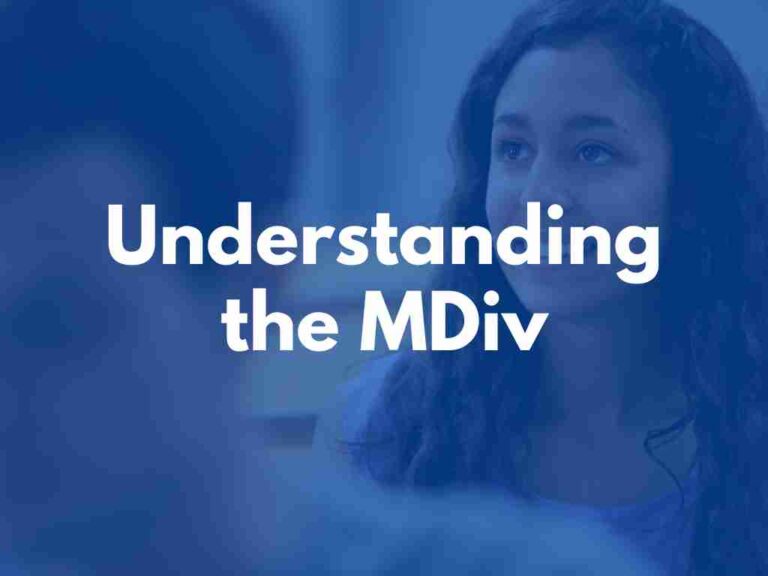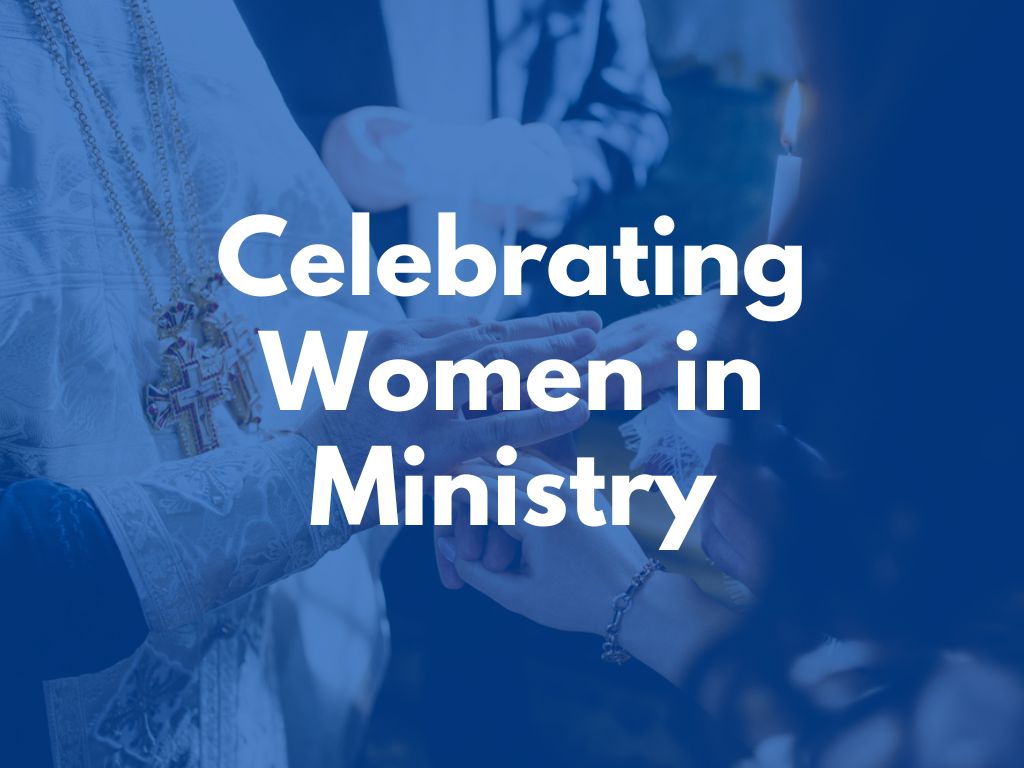Embracing one’s faith is an essential part of life. For some, embracing faith involves choosing the path of ministry. However, it might be somewhat complex trying to determine the best way to engage in study and training that leads to becoming an ordained minister.
In that regard, the Master of Divinity (MDiv) stands out as a cornerstone for those pursuing their religious vocation. An MDiv allows individuals to aspire to roles within ministry, academia, and the broader religious community, assuming key leadership roles. An MDiv provides the primary credentials needed to enter a life of ministry while delivering rigorous training and deep insights into religious studies.
Let’s discuss what an MDiv entails, its significance, and how it can become a gateway to a life of religious leadership.
What Is an MDiv Degree?
An MDiv is a professional graduate degree that prepares an individual to become an ordained minister. Additionally, individuals can assume diverse leadership roles within a community. Overall, an MDiv is one of the most recognized degrees within theological education due to its comprehensive training curriculum and acceptance among churches and communities for those seeking pastoral roles. An MDiv prepares students for diverse roles such as chaplaincy, non-profit leadership, academia, and counseling. As a result, an MDiv is a highly valued qualification among those aspiring to leadership roles within a religious community.
Overview of the MDiv Degree
Historical Background of the MDiv Degree
The MDiv degree has evolved over time. Its roots begin with traditional preparation for clergy, which is the service of a church. Traditionally, aspiring religious leaders were trained through apprenticeship and self-study. However, churches and religious groups formalized theological education during the Middle Ages. Religious leaders attended a university to receive the training needed to assume a leadership role within a church. Nowadays, theological education has achieved a much more structured approach, responding to the complex needs of modern ministry.
Typical Curriculum and Areas of Study
Like any other degree programs, the MDiv encompasses a wide range of areas and subjects. These areas are designed to equip students with the theological acumen needed to succeed in ministry and leadership roles.
These areas include:
- Biblical studies involving in-depth exploration of the Old and New Testaments based on historical contexts, literary analysis, and theological principles.
- The study and discussion of systematic theology, Christian ethics, and analysis of contemporary theological issues.
- Church history based on the development of Christian thought and practice from church beginnings to present-day religious organizations.
- Training in providing spiritual and emotional support to individuals and communities as a core component of pastoral care and counseling.
- Training in understanding and leading religious services and rituals.
- The study of Homiletics, that is, the art and practice of preaching.
Duration and Structure of MDiv Programs
Like most graduate degrees, an MDiv requires three to four years of study. While most MDiv programs require students to take part in full-time training, there are various options to suit student needs. Some degrees can be obtained online, while others may be achieved with part-time enrollment.
On the whole, the structure of MDiv programs involves a combination of classwork, practical field training, and some sort of capstone project or thesis paper. In particular, field training aims to provide hands-on experience within a ministry environment, allowing students to bring this academic and practical experience into a seamless flow.
The Importance and Benefits of an MDiv Degree
The MDiv degree is the most widely accepted standard credential for individuals pursuing religious and pastoral vocations. This degree signifies a comprehensive understanding of theology, scripture, and pastoral practice. As such, an MDiv is an essential step for those aspiring for ordination throughout denominations. Plus, this degree ensures that clergy are well-prepared to lead congregations, deliver spiritual guidance, and address the challenges related to modern ministry.
Career Opportunities for MDiv Graduates
MDiv graduates can expect to pursue any of the following career fields:
- Assume pastoral roles, ministry, or clergy positions in a congregation.
- Provide spiritual care in hospitals, military, prisons, and other institutional settings.
- Lead a faith-based organization.
- Teach theology and religious studies at a college or seminary.
- Combine theological training with counseling to support individuals and families via counseling.
Role in Personal and Spiritual Growth
Beyond its professional benefits, an MDiv degree also fosters personal and spiritual growth. The rigorous academic study of theology, scripture, and ethics challenges students to deepen their faith, reflect on their beliefs, and develop a more nuanced understanding of their spiritual journey. This personal transformation is often one of the most rewarding aspects of pursuing an MDiv degree.
Choosing the Right MDiv Program
Choosing the most appropriate MDiv training program is a major decision for those aspiring to a leadership role within a religious environment. Here are the key factors to consider when looking for the most suitable MDiv program:
- Accreditation is a pivotal factor in choosing the right program. It’s always best to ensure the program is accredited by a recognized body, giving the degree the reliability and credibility needed to support one’s education.
- Also, consider whether a program is affiliated with a specific denomination or church. When MDiv programs are not affiliated with certain denominations or churches, graduates have more flexibility to explore various theological perspectives.
- Lastly, be sure to evaluate the curriculum’s overall focus to determine if it meets areas of interest and specialization opportunities. For instance, some programs focus more on ministry than counseling. Likewise, other programs focus on management more than preaching or teaching. Thus, knowing a program’s focus is crucial in making the right choice.
Importance of Faculty Qualifications and Diversity
Faculty members are a signal of a program’s overall quality. Qualified and experienced faculty offer a wealth of knowledge, different perspectives, and various teaching methods. As a result, the quality and diversity of faculty enhances the learning experience. Engaging with professors with practical ministry experience can become a valuable source of mentorship and guidance.
Resources for Researching and Comparing Programs
The following resources can be useful in researching and comparing MDiv programs:
- Websites of accrediting bodies list accredited schools and programs.
- Denominational websites can offer resources, recommendations, and insights for theological education.
- Also, school and seminary websites provide in-depth information about their programs, curriculum, admissions, and other relevant requirements.
- Online reviews and forums can yield useful information. However, online reviews should be taken with a grain of salt, as not all information is entirely accurate.
Requirements and Preparation for Admission
MDiv programs generally have the following admissions requirements:
- An undergraduate degree from an accredited institution.
- A letter of recommendation from professors or pastors stating qualifications and affirming vocation.
- An essay outlining goals, motivations, and interests in pursuing an MDiv, outlining how the program matches the applicant’s career aspirations.
- Some programs may require an interview as part of the admissions process.
How to Prepare a Strong Application
Preparing an application for an MDiv is no different than any other graduate school program. The following useful tips can help boost an application to any MDiv program:
- It’s essential to clearly articulate the reasons for applying to the MDiv program. These reasons must underscore how the degree aligns with professional and personal aspirations.
- While volunteer work in churches and religious groups is certainly a plus, it is not mandatory. If an applicant does not have any volunteer experience, the application must highlight how the student plans to gain experience within a religious organization or church setting.
- Strong recommendations are always useful. Professional and academic recommendations are important. Nevertheless, personal and character recommendations can be just as valuable.
- Thorough preparation for the interview process is essential. Students must be ready to answer questions about why they want to enter the program and what they plan to do following graduation.
Financing MDiv Education
As with most graduate degrees, financial considerations are critical. That is why knowing how to cover tuition and related expenses is crucial. It’s worth noting that tuition and expenses can vary significantly from one school to another. Tuition and costs include paying for the program itself, books, housing, living expenses, and travel if needed.
In addition to paying for education out of pocket, there are various alternatives to consider when paying for an MDiv degree:
- Many seminaries and divinity schools offer scholarships based on merit, financial need, or denominational affiliation.
- Some religious denominations provide grants and scholarships to students pursuing theological education within their tradition.
- Eligible students can apply for federal and state financial aid, including loans and grants.
- Numerous organizations and foundations offer scholarships for students in theological and religious studies.
Conclusion
An MDiv degree can be the best path for those seeking to dedicate their professional life to ministry, counseling, and spiritual endeavors. At the same time, an MDiv is a great way to embrace one’s religious and spiritual beliefs.
Pursuing an MDiv opens doors across religious fields, allowing graduates to explore vocational goals and personal aspirations. Most importantly, an MDiv does not limit graduates to one field or another. Instead, it can broaden one’s horizons within all facets of religious and local communities.
If you’re passionate about deepening your theological knowledge and pursuing a career in ministry or related fields, take the next step today. Explore MDiv programs, connect with current students and faculty, and start your application process. Your journey towards a fulfilling and impactful career in theology begins with the decision to pursue an MDiv degree.



